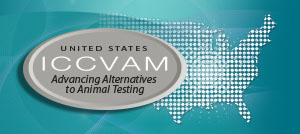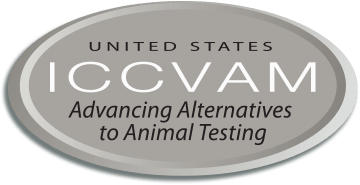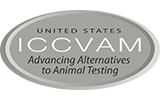Message from NICEATM and ICCVAM
On behalf of the Interagency Coordinating Committee on the Validation of Alternative Methods (ICCVAM) and the National Toxicology Program Interagency Center for the Evaluation of Alternative Toxicological Methods (NICEATM), we are pleased to present the 2020-2021 ICCVAM Biennial Progress Report.
This report provides a comprehensive overview of activities by ICCVAM and its 17 member agencies that support the ICCVAM mission. While these activities vary widely in nature and focus, many notable accomplishments represent advances in the use of computational models. Several articles in the report describe computational approaches for endpoints such as acute systemic toxicity, genotoxicity, skin sensitization, and eye irritation, which are being investigated by ICCVAM agencies to reduce animal use for specific testing applications. Development of both computational and laboratory-based non-animal testing approaches depends on the availability of data that adhere to FAIR data principles: findability, accessibility, interoperability, and reusability. These principles are upheld by the Integrated Chemical Environment resource, which was improved during 2020 and 2021 to update data availability and annotation and launch new tools and associated training materials. These improvements were made in response to evolving ICCVAM agency needs and suggestions by ICCVAM's scientific advisory committee.
A similar spirit of responsiveness to stakeholders underlies the ICCVAM Metrics Workgroup's report, “Measuring U.S. Federal Agency Progress Toward Implementation of Alternative Methods in Toxicity Testing.” This document, published in March 2021, was developed in response to the U.S. Government Accountability Office's recommendation that federal agencies establish a workgroup through ICCVAM to propose metrics for assessing progress on the development and promotion of alternative methods. Articles in this report provide insight into how federal agencies are uniquely addressing implementation of alternative methods and appropriate metrics for assessing animal use.
It is becoming increasingly clear that the acceptance and application of new testing approaches that can reduce and replace animal use will require both new approaches to validation and critical evaluation of current test methods. Several projects described in this report examine variability in reference data from animal studies and consider how such variability could impact the validation of new methods. Other work focuses on human biology-based approaches to method development and validation that move beyond concordance with animal studies.
We would like to acknowledge the contributions of the representatives and interagency workgroup members from the 17 ICCVAM member agencies, NICEATM and its contract staff at Inotiv, the members of ICCVAM's advisory committee, and our many other stakeholders. In particular, we would like to recognize Emily Reinke, Ph.D., who has represented the U.S. Department of Defense (DoD) on ICCVAM since May 2015 and served as ICCVAM co-chair since January 2018. In addition to her expert leadership of the ICCVAM committee and her important contributions to the development of the Strategic Roadmap, Dr. Reinke's engagement and expertise have been key to the success of five ICCVAM workgroups, including those focused on skin sensitization, acute toxicity, and ecotoxicology. Her tenure on ICCVAM ended early in 2022 as she departed DoD to pursue other opportunities. While we will miss interacting with her on ICCVAM, Dr. Reinke plans to remain active in efforts to advance alternatives to animal testing, and we look forward to engaging with her as an ICCVAM stakeholder.
The activities summarized in this biennial report exemplify ICCVAM's ongoing commitment to working with U.S. and international partners to advance the development and acceptance of new scientifically valid test methods that will reduce and eventually replace animal use. We look forward to continued progress and effective interactions with our stakeholders in the coming years.
John Gordon, Ph.D.
Co-Chair, ICCVAM
U.S. Consumer Product Safety Commission
Anna Lowit, Ph.D.
Co-Chair, ICCVAM
Office of Pesticide Programs within the
Office of Chemical Safety and Pollution Prevention
U.S. Environmental Protection Agency
Warren Casey, Ph.D., D.A.B.T.
Administrative Director, ICCVAM
National Institute of Environmental Health Sciences
Nicole Kleinstreuer, Ph.D.
Acting Director, NICEATM
National Institute of Environmental Health Sciences

ICCVAM Co-chair John Gordon, Ph.D.

ICCVAM Co-chair Anna Lowit, Ph.D.

ICCVAM Administrative Director Warren Casey, Ph.D., DABT

Acting NICEATM Director Nicole Kleinstreuer, Ph.D.



